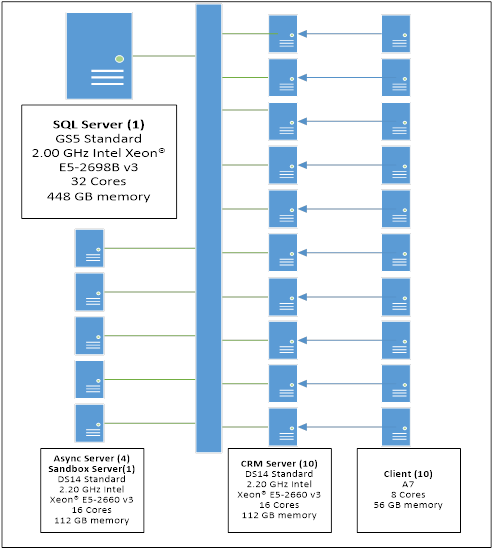Performance for CRM 2016 Service Pack 1 and CRM Online 2016 Update 1
Overview
The Microsoft Dynamics CRM team has been testing the performance of Microsoft Dynamics CRM 2016 Service Pack 1 (SP1) (version 8.1) hosted on Microsoft Azure Virtual Machines. The goal is to establish a baseline for performance on CRM 2016 SP1, using Azure IaaS infrastructure with premium storage. The scenarios we have targeted involve thousands of users accessing their environment concurrently, every few minutes, with various workloads designed to simulate production environment. In this new baseline, we are testing performance against a SQL DB running on VM (Azure GS5 SKU). The detailed configuration, topology, optimizations, data profile, and test workload as well as lessons we learnt along the way on how to really get your Microsoft Dynamics CRM deployment tuned, will be published soon. The upcoming publication will also cover the results from performance testing of Microsoft Dynamics CRM Online 2016 Update 1 (version 8.1) under similar load conditions.
Infrastructure and Environment Configuration
Microsoft SQL Server
SQL Server was deployed on an Azure GS5 virtual machine configured with 32 cores and 448 GB of memory.
| Microsoft SQL Server | |
| Provider | Azure |
| Virtual Machine Type | GS5 Standard |
| Operating System | Microsoft Windows Server 2012 R2 Datacenter |
| Processor | 2.00 GHz Intel Xeon® E5-2698B v3, 32 Cores |
| RAM | 448 GB |
Microsoft Dynamics CRM Server
Dynamics CRM Server was deployed on Azure DS14 virtual machines configured with 16 cores and 112 GB of memory.
| Microsoft Dynamics CRM Servers | |
| Provider | Azure |
| Virtual Machine Type | DS14 Standard |
| Operating System | Microsoft Windows Server 2012 R2 Datacenter |
| Processor | 2.20 GHz Intel Xeon® E5-2660 v3, 16 Cores |
| RAM | 112 GB |
Summary
From the initial round of tests, with around 15,000 concurrent users with personas like salesperson, sales Manager, sales associate, marketing professional, customer service representative etc., we observed an average PLT (Page Load Time) of under a second and average transaction time for typical CRM operations, staying at under couple of seconds. We’ve designed each of these transactions to mimic real world usage, which include scenarios like:
- Basic user interactions like loading entity forms and manipulating grids.
- Searching and advanced find
- Dashboards and reporting
- Appointment, email, phone calls, etc. (activity tracking)
- Coverage over multiple clients (web, mobile, etc.)
- … and more
We targeted and observed an average CPU utilization between 80-90% with these workloads for the duration of the test run. Our aim is to stress test CRM 2016 SP1 and CRM online 2016 Update 1 even more, increasing the numbers of users and test mix values to define a benchmark for on-premises installations and CRM online moving forward.
The results reflect the scalability and performance achieved on a specific Dynamics CRM 2016 implementation running in a particular test environment. Actual performance may vary based on factors ranging from specific customizations deployed to geographic distribution of users and network latency/bandwidth. Customers should expect that results will vary for each implementation and should perform their own performance testing based on their needs or requirements. In some cases, customers may achieve higher levels of performance by fine-tuning or optimizing the configuration of Microsoft Dynamics CRM.
Additional Information
In addition to this performance test run, we have correlated the results found with those observed while performance testing Microsoft IT’s Dynamics CRM Online instances and found an improvement of about 1 second (across different scenarios over the previous baseline for Microsoft CRM Online 2016 Update (version 8.0)).
With these results, we aim to demonstrate the robustness of CRM 2016 SP1 (and CRM online 2016 Update 1) and its capability to handle concurrent user activities with ease for enterprise CRM scenarios. This is the result of significant work put into this CRM release and our unwavering commitment to customers, to excel on performance standards.




